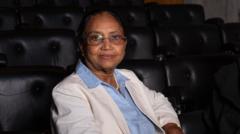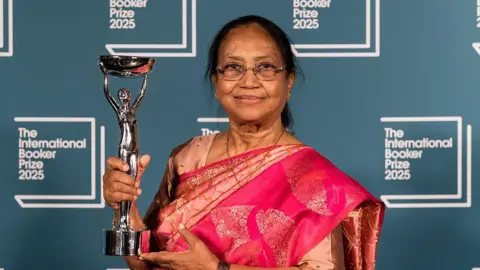Indian writer, lawyer, and activist Banu Mushtaq has made history by clinching the prestigious International Booker Prize for her short story anthology, "Heart Lamp." This remarkable achievement marks the first time a book written in Kannada, the language predominantly spoken in Karnataka, southern India, has received this accolade. The collection includes 12 poignant short stories, translated into English by Deepa Bhasthi, that provide a vivid depiction of the struggles faced by Muslim women in the region.
Mushtaq’s historic recognition follows the success of Geetanjali Shree's “Tomb of Sand,” which won the same award in 2022. Mushtaq’s literary contributions have long been celebrated, but this international recognition sheds new light on her life and work, which tackle the complex issues of religious conservatism and patriarchal oppression. Observers note that Mushtaq's keen self-awareness allows her to create deeply nuanced characters and intricate narratives.
A review from the Indian Express emphasizes, “In a literary culture that rewards spectacle, ‘Heart Lamp’ insists on the value of attention — to lives lived at the edges, to unnoticed choices, to the strength it takes simply to persist. That is Banu Mushtaq's quiet power." Raised in a small Muslim neighborhood in Karnataka, Mushtaq’s educational journey began with studying the Quran in Urdu but shifted at the age of eight when her father enrolled her in a convent school where instruction was in Kannada. She dedicated herself to mastering this new language, which ultimately became the medium for her literary pursuits.
Despite societal pressures to conform, including early marriage at 26, Mushtaq's passion for writing persisted. Her initial struggles were compounded by conflicts in her personal life and societal expectations, leading to poignant reflections in her works. In a candid conversation with Vogue magazine, she recalled the constraints placed on her after her marriage, stating, "I had always wanted to write but had nothing to write (about), because suddenly, after a love marriage, I was told to wear a burqa and dedicate myself to domestic work."
Heart Lamp’s characters embody resilience, pushing back against the simplifications often found in mainstream literature that portray Muslim women as mere symbols of suffering. Critics have praised Mushtaq for her refusal to accept this narrow framing, allowing her characters to endure and negotiate their realities in ways that resonate deeply.
In addition to her literary career, Mushtaq has also worked as a reporter and engaged in advocacy through the Bandaya movement, which challenges social injustices via literature. In her fight for women's rights within the religious context, she faced threats, including a fatwa issued against her, but continued to write with unwavering honesty about women's issues.
Mushtaq’s extensive body of work includes several short story collections, essays, and a novel, garnering numerous accolades over the years, such as the Karnataka Sahitya Academy Award. Most recently, her translated collection "Haseena and Other Stories" received the PEN Translation Prize in 2024, solidifying her place as a crucial voice in contemporary literature.


















